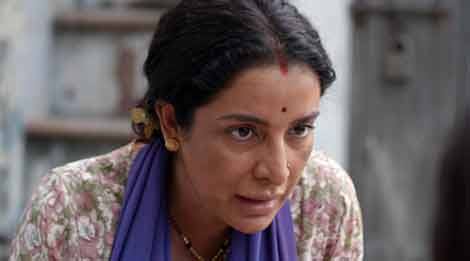On the outset, Ammani seems like one of the countless family dramas about filial responsibility – or the lack of it by greedy family members who value materialism over emotions. But a closer look at the film written and directed by Lakshmy Ramakrishnan that also features her, Subbalakshmi and Nithin Sathya in the leading roles, shows that it is a lot more than that. Each character displays more depth and intricacy in its construct than a simple black-and-white depiction of greed over finer feelings.
Lakshmy plays Saalamma, a helper at a government hospital. She cleans floors, helps patients with their bowel movements every day, and argues against wearing the ID card around her neck as it bothers her. She is a very familiar character. She helps run a dysfunctional family that only cares about her retirement fund.
But unlike, say, in Rajnikanth’s Aarlirirunthu Arubadhu Varai, the characters around her are not homogenously evil: they are merely people with human needs. Saalamma’s sons, who take advantage of her feelings for them, cannot be seen as freeloaders; rather, they are helpless people who have done their best to survive but are reduced to depending on her owing to unfavorable circumstances.
*****
But before we conclude that this is a ‘message movie’ about the need for filial duty, we realize the focus is on Saalamma, who exudes the idea that one must take responsibility for one’s own life. This message is delivered by the titular character, Ammani (Subbalakshmi), an octogenarian rag-picker who has realised the fact that happiness and contentment are achieved only when one forgoes expectations. She could easily have been a woeful tear-jerker of a woman. But Ammani makes us laugh with her ingenuity. Hers is a character that has been intelligently written and Lakshmy deserves credit for it.
Ammani sings poignant songs that relate to situations that break out at Salamma’s home, but she also breaks into a cheerful Munbe Vaa as she looks at herself fondly in a mirror, combing her hair. She is admitted to a hospital after passing out, but the first thing she asks for after coming to is her mirror and comb. Subbalakshmi is one of the most endearing senior actors in Malayalam cinema, and she is equally lovable on screen in Ammani.
Lakshmy Ramakrishnan does make her portrayal of Saalamma believable despite visibly struggling to get the north Chennai accent right. In a scene where Saalamma’s hopes of bringing peace between her quarreling sons fail, Lakshmy strikes gold with her expressions of shame, shock, and angst that culminate in tears.
In one scene, Saalamma brags to her friends about her imagination of her own death. The scene then breaks into a song that depicts family members doing the oppari and her body being paraded around the neighborhood in a vintage car. There would be the dappankuthu dancers, and even a Robo Shankar dressed up as Yamaraj, singing about how life is like a prepaid SIM card that cannot be recharged once the balance runs out. This scene highlights the freshness in portrayal of deprivation: the protagonist for whom life has been a struggle for survival sees humour in death – as occasion for celebration in a non-cynical way.
*****
For a film that does not take advantage of its premise and become melodramatic, Ammani still panders to clichés at places: for instance Salamma’s family that has always tried to rid itself of Ammani rushes to embrace her when she gains wealth; the manner in which Ammani claims that she would be unwanted again when her purse is empty.
Recommended
Music director K’s score provides vital support to the montages without overshadowing the scenes. K, just like he did in films like Kirumi and Aandavan Kattalai, brings a rare kind of joy into the proceedings with his endearing music. Most of the film has been shot inside a dingy home bringing enhancing the authenticity of the characters and situations. The filming angles and the meticulousness of division of shots in scenes involving several characters crammed into the small space, show finesse.
Ammani is an interesting film which breaks a few stereotypes – it challenges the monolithic portrayal of poverty and desperation. Just like Kaakka Muttai and Aandavan Kattalai, Ammani makes a point – without being too preachy.
*****
The Ammani review is a Silverscreen original article. It was not paid for or commissioned by anyone associated with the movie. Silverscreen.in and its writers do not have any commercial relationship with movies that are reviewed on the site.


